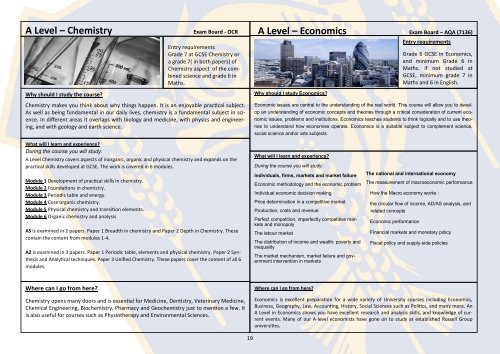Prospectus 2020-2022
The sixth form prospectus for students looking to join an Ofsted 'Outstanding' provision with a national reputation for academic success (top 17% for progress) sporting success (nationally recognised for rugby and cross-country) and cultural excellence through music and art.
The sixth form prospectus for students looking to join an Ofsted 'Outstanding' provision with a national reputation for academic success (top 17% for progress) sporting success (nationally recognised for rugby and cross-country) and cultural excellence through music and art.
Create successful ePaper yourself
Turn your PDF publications into a flip-book with our unique Google optimized e-Paper software.
A Level – Chemistry<br />
Why should I study the course?<br />
Exam Board - OCR<br />
Entry requirements<br />
Grade 7 at GCSE Chemistry or<br />
a grade 7( in both papers) of<br />
Chemistry aspect of the combined<br />
science and grade 6 in<br />
Maths.<br />
A Level – Economics Exam Board – AQA (7136)<br />
Why should I study Economics?<br />
Entry requirements<br />
Grade 6 GCSE in Economics,<br />
and minimum Grade 6 in<br />
Maths. If not studied at<br />
GCSE, minimum grade 7 in<br />
Maths and 6 in English.<br />
Chemistry makes you think about why things happen. It is an enjoyable practical subject.<br />
As well as being fundamental in our daily lives, chemistry is a fundamental subject in science.<br />
In different areas it overlaps with biology and medicine, with physics and engineering,<br />
and with geology and earth science.<br />
Economic issues are central to the understanding of the real world. This course will allow you to develop<br />
an understanding of economic concepts and theories through a critical consideration of current economic<br />
issues, problems and institutions. Economics teaches students to think logically and to use theories<br />
to understand how economies operate. Economics is a suitable subject to complement science,<br />
social science and\or arts subjects.<br />
What will I learn and experience?<br />
During the course you will study:<br />
A Level Chemistry covers aspects of inorganic, organic and physical chemistry and expands on the<br />
practical skills developed at GCSE. The work is covered in 6 modules.<br />
Module 1 Development of practical skills in chemistry.<br />
Module 2 Foundations in chemistry.<br />
Module 3 Periodic table and energy.<br />
Module 4 Core organic chemistry.<br />
Module 5 Physical chemistry and transition elements.<br />
Module 6 Organic chemistry and analysis<br />
AS is examined in 2 papers. Paper 1 Breadth in chemistry and Paper 2 Depth in Chemistry. These<br />
contain the content from modules 1-4.<br />
A2 is examined in 3 papers. Paper 1 Periodic table, elements and physical chemistry. Paper 2 Synthesis<br />
and Analytical techniques. Paper 3 Unified Chemistry. These papers cover the content of all 6<br />
modules.<br />
What will I learn and experience?<br />
During the course you will study:<br />
Individuals, firms, markets and market failure<br />
Economic methodology and the economic problem<br />
Individual economic decision making<br />
Price determination in a competitive market<br />
Production, costs and revenue<br />
Perfect competition, imperfectly competitive markets<br />
and monopoly<br />
The labour market<br />
The distribution of income and wealth: poverty and<br />
inequality<br />
The market mechanism, market failure and government<br />
intervention in markets<br />
The national and international economy<br />
The measurement of macroeconomic performance<br />
How the Macro economy works :<br />
the circular flow of income, AD/AS analysis, and<br />
related concepts<br />
Economic performance<br />
Financial markets and monetary policy<br />
Fiscal policy and supply-side policies<br />
Where can I go from here?<br />
Where can I go from here?<br />
Chemistry opens many doors and is essential for Medicine, Dentistry, Veterinary Medicine,<br />
Chemical Engineering, Biochemistry, Pharmacy and Geochemistry just to mention a few. It<br />
is also useful for courses such as Physiotherapy and Environmental Sciences.<br />
Economics is excellent preparation for a wide variety of University courses including Economics,<br />
Business, Geography, Law, Accounting, History, Social Sciences such as Politics, and many more. An<br />
A Level in Economics shows you have excellent research and analysis skills, and knowledge of current<br />
events. Many of our A-level economists have gone on to study at established Russell Group<br />
universities.<br />
19
















